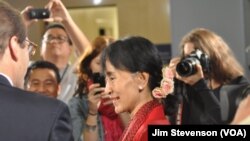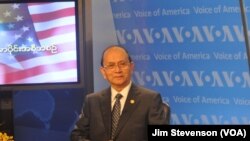I closely follow the trips of leaders because that’s part of reporting the news as a broadcaster. Mrs. Obama’s trip to China is no exception. She is not a leader in the sense she is a president or high ranking official. But as First Lady, she does carry importance in representing the United States and values we care about, like education.
What personally resonates with me is her itinerary. I have had the good fortune to visit the same three cities - Beijing, Xi’an and Chengdu – and set foot in the same cultural and historic places – Forbidden City, Summer Palace, the Mutianyu section of the Great Wall, terra cotta warriors, Xi’an City wall, and Chengdu Research Base.
Sometimes I wonder about the relevance of such trips, what impact Mrs. Obama could really have. I remember back a couple of years to a visit by Burmese pro-democracy leader Aung San Suu Kyi to the Voice of America, and later a visit by Burmese president Thein Sein. I only caught a glimpse of each as they made their way to interviews with other journalists. But to actually see them fairly close greatly humanized for me the Burma stories I have presented on the air since.
For many young Chinese students who have been able to meet Mrs. Obama and her daughters, they have had perhaps a similar experience. Perhaps her visit will inspire them to one day visit the United States, study or build a professional career here. They certainly will never forget seeing Mrs. Obama in person and those memories can only help to build positive bridges between our nations
What personally resonates with me is her itinerary. I have had the good fortune to visit the same three cities - Beijing, Xi’an and Chengdu – and set foot in the same cultural and historic places – Forbidden City, Summer Palace, the Mutianyu section of the Great Wall, terra cotta warriors, Xi’an City wall, and Chengdu Research Base.
Sometimes I wonder about the relevance of such trips, what impact Mrs. Obama could really have. I remember back a couple of years to a visit by Burmese pro-democracy leader Aung San Suu Kyi to the Voice of America, and later a visit by Burmese president Thein Sein. I only caught a glimpse of each as they made their way to interviews with other journalists. But to actually see them fairly close greatly humanized for me the Burma stories I have presented on the air since.
For many young Chinese students who have been able to meet Mrs. Obama and her daughters, they have had perhaps a similar experience. Perhaps her visit will inspire them to one day visit the United States, study or build a professional career here. They certainly will never forget seeing Mrs. Obama in person and those memories can only help to build positive bridges between our nations






